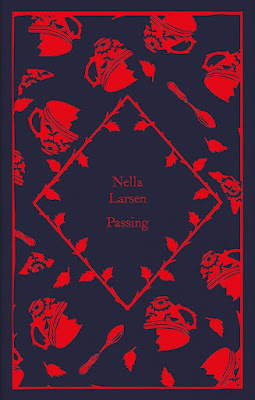Book #36
Clare Kendry, elegant, fair-skinned and ambitious, is married to a white man who is unaware of her African-American heritage. When she reunites with childhood friend Irene, who has not hidden her origins, both women are forced to confront the secret fears they have buried within themselves.
I had never heard of this story before, and it only ended up on my shelf due to being snuggled up within a gorgeous Penguin hardcover which caught my eye. No, we shouldn’t judge books by their cover, but this one’s aesthetic got it home with me. And what a choice, what a cover, what a story.
On the surface, we’re exploring racial identity and the concept of passing, and this itself is fascinating. Clare is a woman of Black heritage whose skin is light enough to allow her to ‘pass’ as a white woman, and she goes ahead and does so. She marries a white man, she runs in white circles, she goes to white-only establishments where the whites are none the wiser. After years of this life, she gets in touch with her old friend Irene simply because she misses her heritage, her old friends, and presumably their way of life and customs.
It’s such an interesting concept. After years of being told your race, your life, even your rights, are inferior to those of white people, it would seem natural to try and claim all of those things back for yourself. But what would you choose, if this was at the expense of your background, your values, your very self? Do you push for more, or do you remain yourself? Of course the best answer to this is to both push and remain who you are whilst doing so, but in the 1920s and even now, this is difficult if not nigh on impossible in white-dominated environments.
And despite Clare’s passing being the main concept here, Larsen subtly also explores passing in other ways. As soon as Clare contacts Irene, seeking a return to her heritage, Irene is overcome with feelings of dread and apprehension at the prospect of seeing Clare again. As the story progresses, it’s clear Irene has an admiration for Clare which terrifies her, one which she attempts to keep hidden, and which manifests as hatred, and perhaps jealousy. Both of these women are passing, although neither of them seem to realise the true extent of it. Despite symbolising the disdain the Black community has for Clare and her life choices, Irene also stands as a lesson - the trauma which can result from suppressing your true self is Irene’s final message.
A fascinating and deeply informative short story, made all the more impactful after reading of Larsen’s life post-publication. Truly, truly, a masterpiece in my mind.

